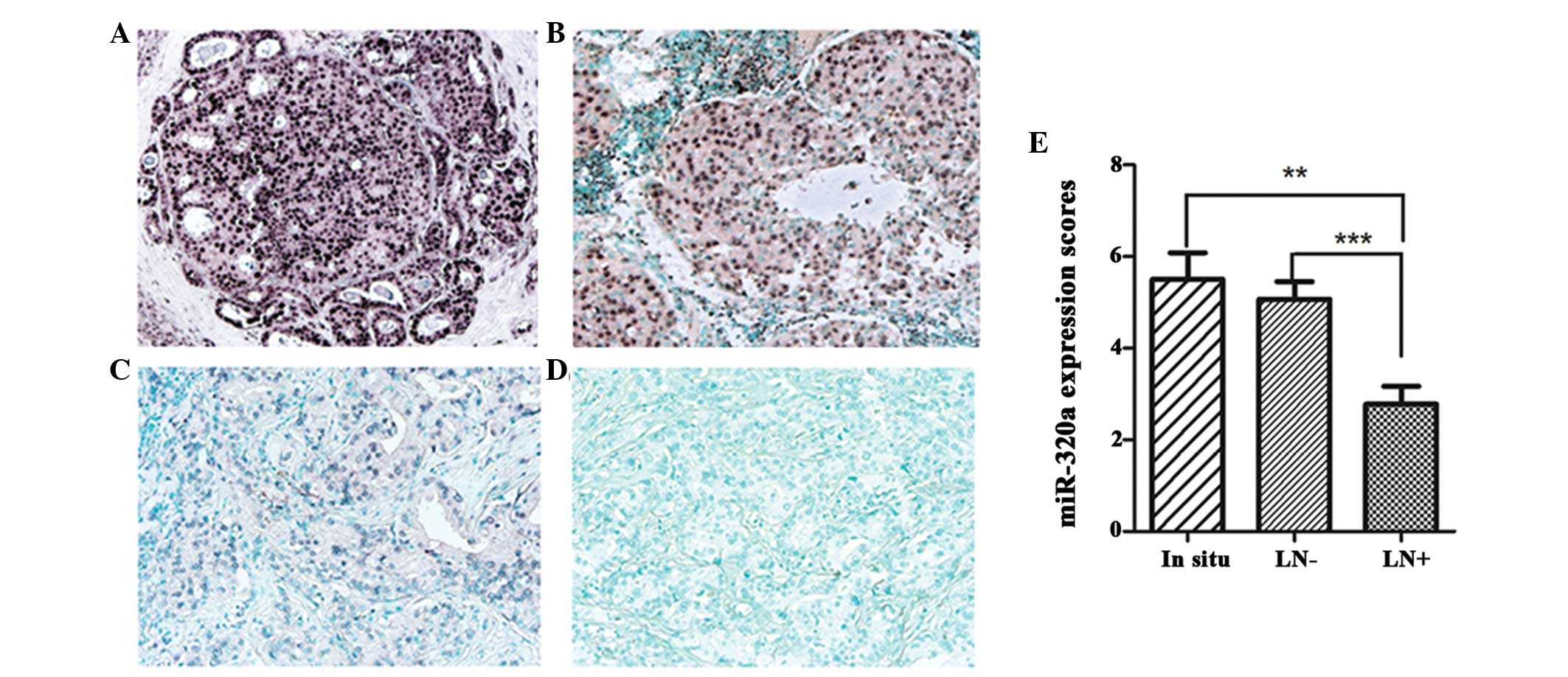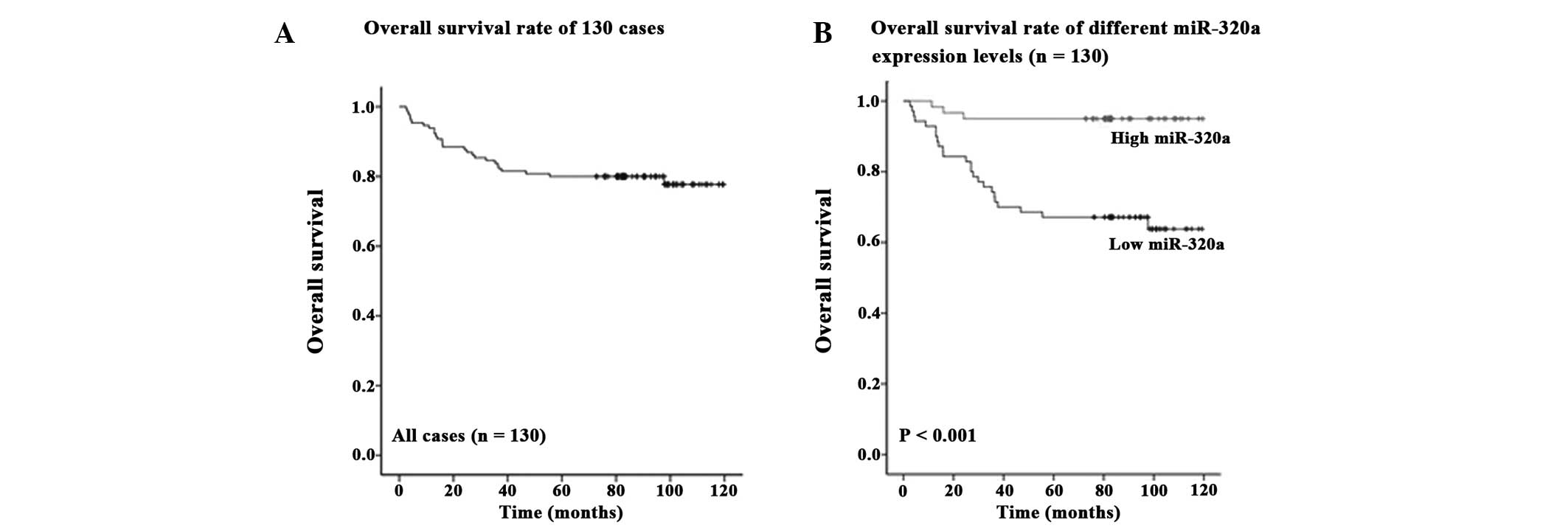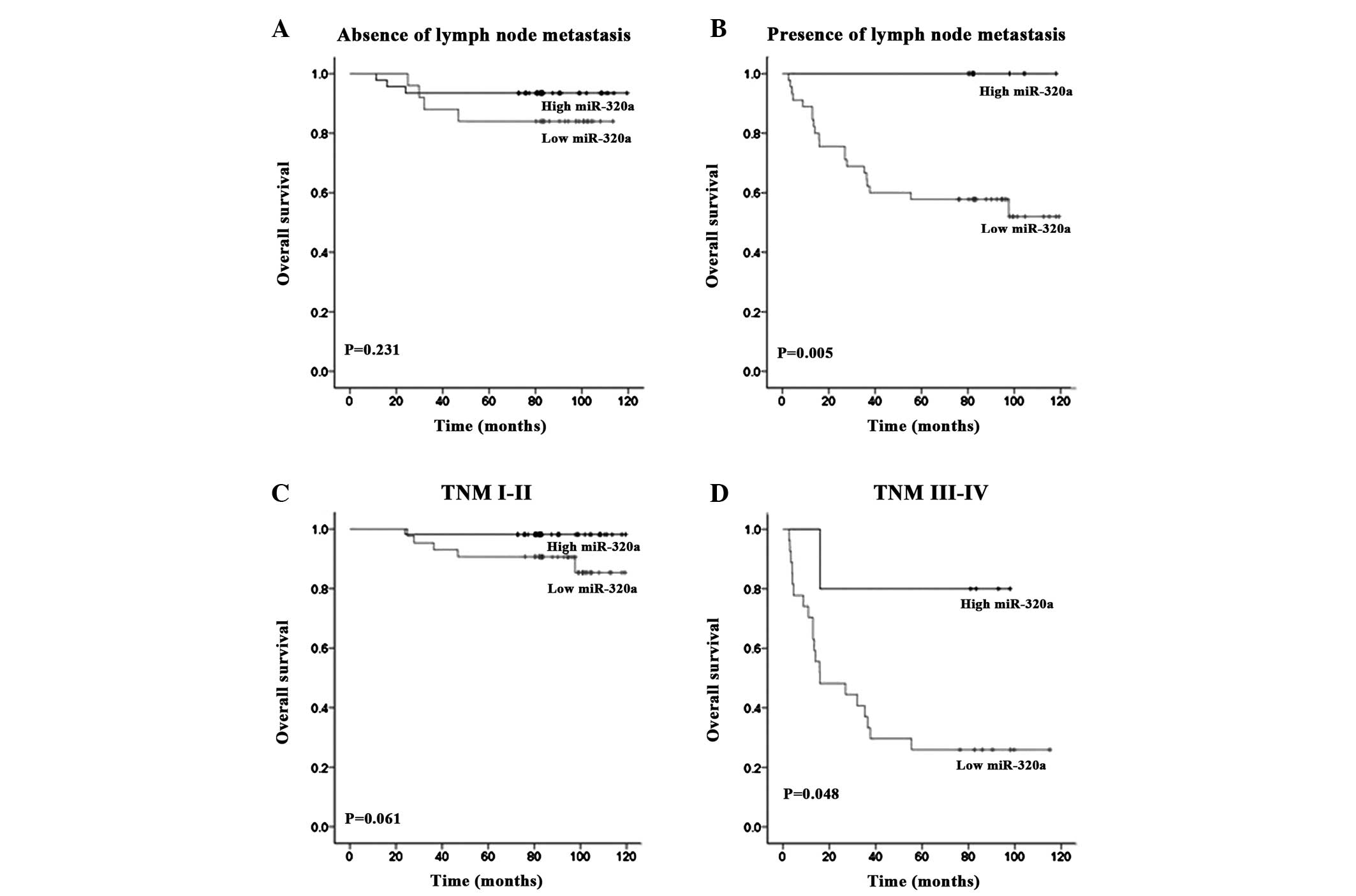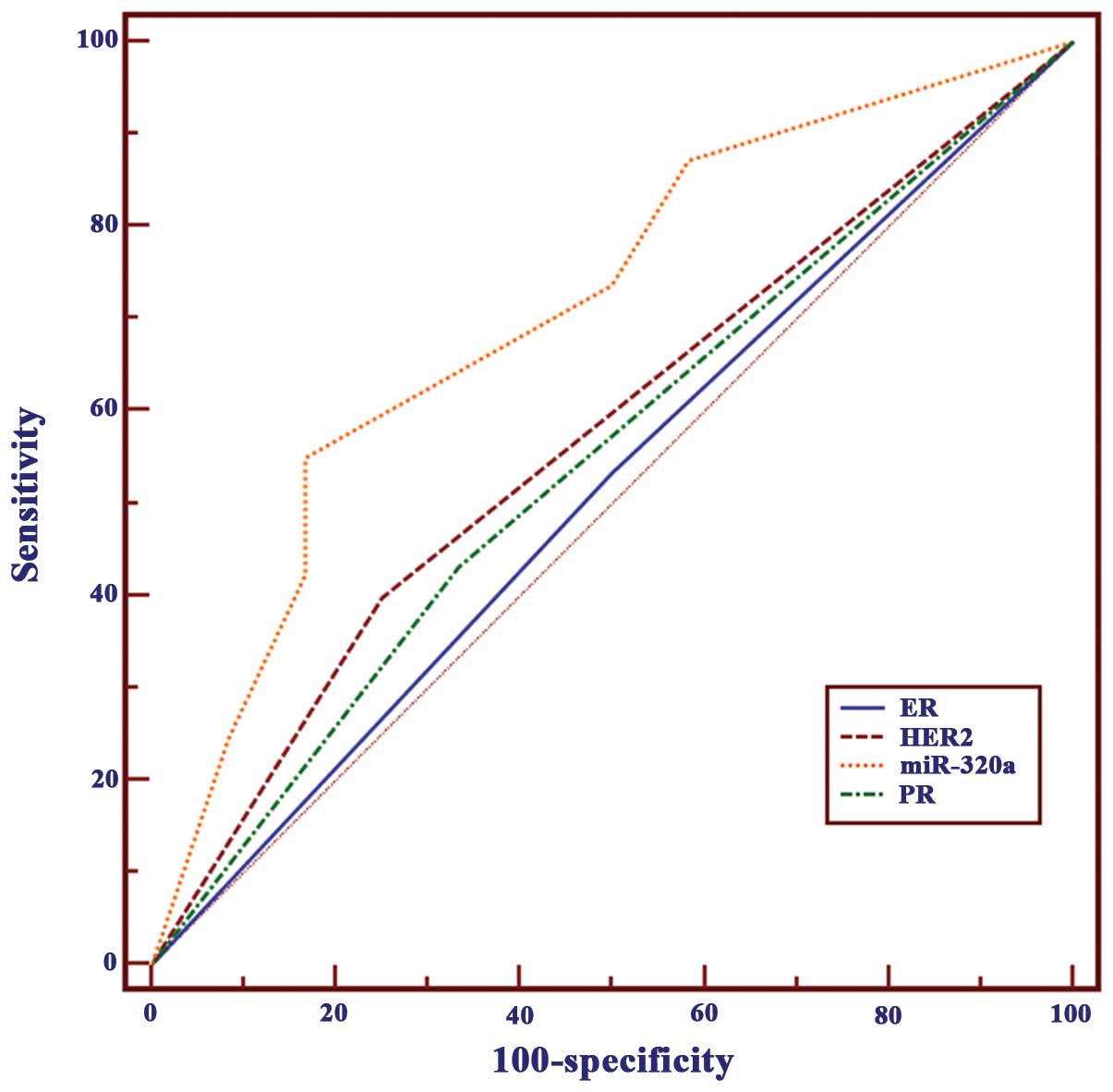|
1
|
Yu G, Liu G, Dong J and Jin Y: Clinical
implications of CIP2A protein expression in breast cancer. Med
Oncol. 30:5242013.
|
|
2
|
Wu ZS, Wu Q, Wang CQ, et al: MiR-339-5p
inhibits breast cancer cell migration and invasion in vitro and may
be a potential biomarker for breast cancer prognosis. BMC Cancer.
10:5422010.
|
|
3
|
Hanna JA, Hahn L, Agarwal S and Rimm DL:
In situ measurement of miR-205 in malignant melanoma tissue
supports its role as a tumor suppressor microRNA. Lab Invest.
92:1390–1397. 2012.
|
|
4
|
Shenouda SK and Alahari SK: MicroRNA
function in cancer: oncogene or a tumor suppressor? Cancer Metast
Rev. 28:369–378. 2009.
|
|
5
|
Wu W, Takanashi M, Borjigin N, et al:
MicroRNA-18a modulates STAT3 activity through negative regulation
of PIAS3 during gastric adenocarcinogenesis. Br J Cancer.
108:653–661. 2013.
|
|
6
|
Wu ZS, Wu Q, Wang CQ, et al: miR-340
inhibition of breast cancer cell migration and invasion through
targeting of oncoprotein c-Met. Cancer. 117:2842–2852. 2011.
|
|
7
|
Zhang B, Pan X, Cobb GP and Anderson TA:
microRNAs as oncogenes and tumor suppressors. Dev Biol. 302:1–12.
2007.
|
|
8
|
Welch C, Chen Y and Stallings RL:
MicroRNA-34a functions as a potential tumor suppressor by inducing
apoptosis in neuroblastoma cells. Oncogene. 26:5017–5022. 2007.
|
|
9
|
Gartel AL and Kandel ES: miRNAs: Little
known mediators of oncogenesis. Semin Cancer Biol. 18:103–110.
2008.
|
|
10
|
Sun JY, Huang Y, Li JP, et al:
MicroRNA-320a suppresses human colon cancer cell proliferation by
directly targeting β-catenin. Biochem Biophys Res Commun.
420:787–792. 2012.
|
|
11
|
Zhang Y, He X, Liu Y, et al: microRNA-320a
inhibits tumor invasion by targeting neuropilin 1 and is associated
with liver metastasis in colorectal cancer. Oncol Rep. 27:685–694.
2012.
|
|
12
|
Xu G, Wu J, Zhou L, et al:
Characterization of the small RNA transcriptomes of androgen
dependent and independent prostate cancer cell line by deep
sequencing. PLoS One. 5:e155192010.
|
|
13
|
Xu Q, Dong QG, Sun LP, et al: Expression
of serum miR-20a-5p, let-7a, and miR-320a and their correlations
with pepsinogen in atrophic gastritis and gastric cancer: a
case-control study. BMC Clin Pathol. 13:112013.
|
|
14
|
Tavassoli FA and Devilee P: World Heatlh
Organization Classification of Tumours. Pathology and Genetics,
Tumors of the Breast and Female Genital Organs. IARC Press; Lyon:
pp. 102003
|
|
15
|
Allred DC, Wu Y, Mao S, et al: Ductal
carcinoma in situ and the emergence of diversity during breast
cancer evolution. Clin Cancer Res. 14:370–378. 2008.
|
|
16
|
Tang W, Zhu J, Su S, et al: MiR-27 as a
prognostic marker for breast cancer progression and patient
survival. PLoS One. 7:e517022012.
|
|
17
|
Nie Y, Liu X, Qu S, et al: Long non-coding
RNA HOTAIR is an independent prognostic marker for nasopharyngeal
carcinoma progression and survival. Cancer Sci. 104:458–464.
2013.
|
|
18
|
Cao XX, Xu JD, Liu XL, et al: RACK1: A
superior independent predictor for poor clinical outcome in breast
cancer. Int J Cancer. 127:1172–1179. 2010.
|
|
19
|
Dillhoff M, Liu J, Frankel W, et al:
MicroRNA-21 is overexpressed in pancreatic cancer and a potential
predictor of survival. J Gastrointest Surg. 12:2171–2176. 2008.
|
|
20
|
Diakos C, Zhong S, Xiao Y, et al: TEL-AML1
regulation of survivin and apoptosis via miRNA-494 and miRNA-320a.
Blood. 116:4885–4893. 2010.
|
|
21
|
Hummel R, Wang T, Watson DI, et al:
Chemotherapy-induced modification of microRNA expression in
esophageal cancer. Oncol Rep. 26:1011–1017. 2011.
|
|
22
|
Salendo J, Spitzner M, Kramer F, et al:
Identification of a microRNA expression signature for
chemoradiosensitivity of colorectal cancer cells, involving
miRNAs-320a, -224, -132 and let7g. Radiother Oncol. 108:451–457.
2013.
|
|
23
|
Yu H, Giai M, Diamandis EP, et al:
Prostate-specific antigen is a new favorable prognostic indicator
for women with breast cancer. Cancer Res. 55:2104–2110. 1995.
|
|
24
|
Crowe JP, Hubay CA, Pearson OH, et al:
Estrogen receptor status as a prognostic indicator for stage I
breast cancer patients. Breast Cancer Res Treat. 2:171–176.
1982.
|
|
25
|
Marty M, Cognetti F, Maraninchi D, et al:
Randomized phase II trial of the efficacy and safety of trastuzumab
combined with docetaxel in patients with human epidermal growth
factor receptor 2-positive metastatic breast cancer administered as
first-line treatment: the M77001 study group. J Clin Oncol.
23:4265–4274. 2005.
|
|
26
|
Horiguchi J, Iino Y, Takei H, et al:
c-erbB-2 status is an independent predictor of survival after first
recurrence. Int J Oncol. 12:123–128. 1998.
|
|
27
|
Wu Y, Khan H, Chillar R and Vadgama JV:
Prognostic value of plasma HER-2/neu in African American and
Hispanic women with breast cancer. Int J Oncol. 14:1021–1037.
1999.
|
|
28
|
Fagerholm R, Sprott K, Heikkinen T, et al:
Overabundant FANCD2, alone and combined with NQO1, is a sensitive
marker of adverse prognosis in breast cancer. Ann Oncol.
24:2780–2785. 2013.
|
|
29
|
Chang J, Clark GM, Allred DC, et al:
Survival of patients with metastatic breast carcinoma: importance
of prognostic markers of the primary tumor. Cancer. 97:545–553.
2003.
|
|
30
|
Hall JS, Taylor J, Valentine HR, et al:
Enhanced stability of microRNA expression facilitates
classification of FFPE tumour samples exhibiting near total mRNA
degradation. Br J Cancer. 107:684–694. 2012.
|
|
31
|
Jung M, Schaefer A, Steiner I, et al:
Robust microRNA stability in degraded RNA preparations from human
tissue and cell samples. Clin Chem. 56:998–1006. 2010.
|
|
32
|
Ma Y, Zhang P, Wang F, et al: miR-150 as a
potential biomarker associated with prognosis and therapeutic
outcome in colorectal cancer. Gut. 61:1447–1453. 2012.
|


















